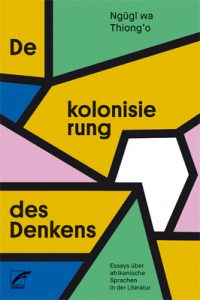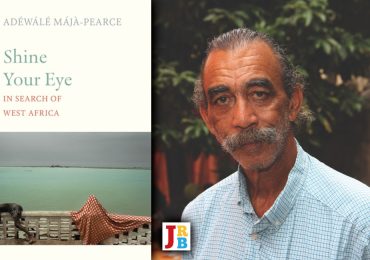
Exclusive to The JRB, a new essay by Petina Gappah on the influence of Ngũgĩ wa Thiong’o’s work on her writing, excerpted from a new German edition of Decolonising the Mind.
Dekolonisierung des Denkens, translated from the English by Thomas Brückner, was published in October 2017 by Unrast Verlag. Also featured in this edition are essays by Sonwabiso Ngcowa (South Africa), Boubacar Boris Diop (Senegal), Achille Mbembe (Cameroon/South Africa) and Mukoma wa Ngugi (Kenya).
Berlin of 1884 was effected through the sword and the bullet. But the night of the sword and the bullet was followed by the morning of the chalk and the blackboard. The physical violence of the battlefield was followed by the psychological violence of the classroom. But where the former was visibly brutal, the latter was visibly gentle … The bullet was the means of physical subjugation. Language was the means of the spiritual subjugation.
—Ngũgĩ wa Thiong’o
I am thrilled to be one of the writers from the African continent who has been asked to write an introduction to this long-overdue German translation of the book by Ngũgĩ wa Thiong’o that has had the most profound impact on me: Decolonising the Mind. In this slim and elegant treatise, and with his typical erudition, passion, clinical dissection, and flashes of humour, Ngũgĩ wa Thiong’o takes a passionate, principled and urgent stand in support and defence of African languages.
I had the great privilege to meet Ngũgĩ in 2012 at the Gothenburg Book Festival, where more than sixty writers from across the continent of Africa were guests of honour. I had long been an admirer of his fiction, from the time I read his moving novel The River Between as a schoolgirl in Harare, but it was his polemical work Decolonising the Mind that had the greatest impact on me.
I first read Decolonising the Mind in 1995. I was a postgraduate student in Austria, writing my Doktorarbeit at the Institut für Völkerrecht at the Rechtswissenschaften Fakultät at the University of Graz. Bored out of my mind by my thesis in trade law, I took solace in my real love, which was reading. I haunted the library of the Institut für Anglistik und Amerikanistik, and borrowed books by the bucketload. It was there, in the middle of my first Austrian winter, that I read Decolonising the Mind.
As I would tell Ngũgĩ when I met him in Gothenburg many years later, the book had a deeply profound effect on me—one that was both uplifting and debilitating. His central and irrefutable argument is that Africans have experienced two forms of colonisation: that of their land and of their minds. With every African state now independent, the colonisation of the land is over. What remains is the debilitating colonisation of the mind, which makes colonisation permanent long after its physical aspects end. For what the coloniser achieved was to separate the African from the language of his culture and community by inculcating in him the belief that the language of his education was not only superior, but also the means of his civilisation.
Ngũgĩ’s response to that process is to assert the dignity of African languages as a method of instruction and as a means of writing and seeing the world, to assert once and for all the relevance of our languages, and in that way to bring back the disrupted harmony between language and world-view. The book concludes with a declaration that was, as his consistency and commitment have proven, both a programme of action and a call to arms: From now on it is Gĩkũyũ and Kiswahili all the way!
It seemed to me when I read Decolonising the Mind that Ngũgĩ had looked into my education and written about me. For the experience he narrates of his education in Kenya in the nineteen-fifties was the same story I experienced in Zimbabwe in the nineteen-eighties and nineteen-nineties.
Like Ngũgĩ had in Gĩkũyũ, I had won prizes for the Shona language in the first three years of my education. During those early years I went to a township school in Salisbury (now Harare), the capital of what was then Rhodesia. Like Ngũgĩ, I thrilled in the traditional folk tales my mother and grandmothers told me; my mind was perfectly at ease in the world of these stories. And like Ngũgĩ, I lived a world where the spheres of school, play, home life and township life were in harmony with the language we spoke every day, the language of Shona, a living and dynamic language that was constantly adapting itself to modernity.
But everything about my relationship to my language changed after those first three years. From the age of nine, when Rhodesia became the independent nation of Zimbabwe and educational and residential segregation ended, I was enrolled at a school that had formerly been Whites Only. All instruction was in English, and there was no question at all of any of the children learning Shona, even though it was the language spoken by the majority of people in Zimbabwe. Shona was only introduced when the government changed the curriculum, in my last year of primary school. Even then, we were taught something called ‘L2’ or ‘Shona As A Second Language’. I have strong memories of the twenty-six children in our class stuttering and stammering, much to the frustration of our teacher Mr Makwarimba, as we tried and failed to read books written in our own language.
This entirely inadequate grounding in my own language meant that by the time I reached secondary school I was woefully unprepared for the study of Shona, which had now become a compulsory subject. I had received only three years of substantial instruction in the language, those three years being at the very beginning of my education. My Shona had atrophied and had not progressed beyond those three early years. And there I was tackling complex literature that used proverbs and allegories and was completely mystifying to me. By the time I reached secondary school my own language presented itself to me as form of torture.
I was reminded of those days as I read Ngũgĩ’s work. He speaks eloquently of the attitudes that constantly reinforced the message of the inferiority of our own language. Even as we were studying complex and beautiful works of literature at secondary school, we were living a schizophrenic life that was out of harmony with the language we spoke. We were absorbing the deeply damaging lesson that our language was not necessary to express our everyday reality.
At Ngũgĩ’s colonial school, the most humiliating experience was to be caught speaking Gĩkũyũ. As he writes: ‘The culprit was given corporal punishment—three to five strokes of the cane on bare buttocks—or was made to carry a metal plate with instructions such as I AM STUPID or I AM A DONKEY. Sometimes the culprits were fined money they could hardly afford’. How did the teachers identify the culprits? By means of a button, he writes, which was given to any pupil caught speaking his mother tongue.
Thirty years after Ngũgĩ left school, in another African country, the independent and decolonised country of Zimbabwe, the Dominican nuns who ran our secondary school implemented a similar system. The schoolgirls were forced to circulate among ourselves something we called The Button, which was not a button at all, but a brown piece of wood with a hole and string through it. We were to give The Button to any girl who was heard speaking Shona, and at the end of the school day the girl with The Button paid five cents as punishment.
The money was nothing, five cents was an inconsequential sum. As at Ngũgĩ’s school, The Button’s effectiveness lay in humiliation. Our school was insistent that English was to be treated seriously; it was the official language of instruction, and the school intended that as long as we were within school hours and outside Shona lessons we would speak English and only English, so essential to the maintenance of our school’s exceptionally-high pass-rate at O-level, even if it meant humiliating one girl a day to keep it. And so speaking Shona was associated with humiliation.
In his exceptional introduction to Frantz Fanon’s The Wretched of the Earth, the French philosopher Jean-Paul Sartre writes that colonised people are caught between two worlds that make ‘two bewitchings’: ‘they dance all night and at dawn they crowd into the churches to hear mass; each day the split widens’. ‘The status of “native”,’ Sartre added, ‘is a nervous condition introduced and maintained by the settler among colonised people with their consent’.
The phrase was later picked up by the Zimbabwean author Tsitsi Dangarembga in the novel Nervous Conditions, a seminal work that addresses the mental strains imposed on girls educated in the same manner I was educated, who took to heart the idea constantly-repeated throughout our education: that African languages, and consequently the African world-view—for what is language if not a way of presenting and understanding a world-view?—were inferior.
I was more fortunate than Nyasha, the ill-fated heroine of Dangarembga’s novel, for though I did not have the clarity of thinking Ngũgĩ marshals to such stunning effect in Decolonising the Mind, I came to recognise my ‘nervous condition’ and the inadequacy of my education early on. What is more, I was absolutely determined to do something about it. I was determined to conquer my own language.
At my next school, a Jesuit school at which I completed the last two years of my education, I vowed to study Shona, along with English and History, as my three A-Level subjects. There the study of Shona was different than it had been at my previous two schools. Shona was not a subject forced on unwilling students, but the determined choice of a select few. In our small class of just sixteen students, I fell irrevocably in love with my own language.
We studied Shona in all its forms: modern and traditional poetry, plays, novels and essays, creative writing, grammar and comprehension. In just two years, I received the complete education in Shona that I had missed all my life. True, Shona was by far the least popular subject at A-Level, and we encountered much derision from our classmates, who joked that those of us who did Shona were destined to go on to become n’angas or traditional healers, an occupation that many in predominantly Christian Zimbabwe still associate with ignorance, primitiveness and heathen practices.
What did it say about our schoolmates, that the study of our language was associated with a lack of civilisation? As Sartre says, the ‘nervous condition’ of the native is ‘introduced and maintained by the settler among the colonised people with their consent’. The emphasis on consent here is important: the colonised not only absorb these harmful ideas, but also police the conduct that counters them.
This is why Ngũgĩ’s call to decolonise the mind is as urgent now, in 2017, as it was in 1986 ,when he first wrote the book, and why I am enormously grateful that I read Decolonising the Mind long before I began to write seriously. I knew early-on that I wanted to be a writer, but without Decolonising the Mind I may not have given serious thought to the matter of language.
I do not agree with everything Ngũgĩ writes. His criticism of Chinua Achebe, Leopold Senghor, Gabriel Okara and other writers who write in English, French and other imposed languages is to my mind unfair, for it can no longer be disputed that the languages of colonialism have, just like Western dress, technology or, indeed, Christianity and Islam, become institutionalised and entrenched as part of African modernity.
Ngũgĩ’s argument suggests that there is only one way to be an African writer and, given the diversity of African voices and experiences, such an approach is too prescriptive. Indeed, while I could not help but nod and cheer along with the polemical arguments he makes so forcefully, as an aspiring writer this book initially discouraged me. Though I had conquered my language and achieved the top grade in Shona at A-Level, I knew I had done it by writing factual, incisive and critical essays, the kind that I would come to write as a lawyer. I knew I was weakest when I tried to write creative fiction in Shona. There I felt my loss keenly—I felt something missing in my writing. The soul of the language had been denied me by the many years in which I had not studied it at the crucial primary school years, when language and facility develop. I could write with precision and incisiveness, but not with lyricism or music. Was I doomed then never to be a writer, simply because I could not write as lyrically in Shona as I did in English?
When I read Ngũgĩ, and he declared that from now on it would be Gĩkũyũ and Kiswahili all the way, I took it to mean that I could not write at all, because my Shona was simply not of the expected standard. It was a heartbreaking thing to recognise. But the urge to write, and to write in English, was obsessive.
I thought deeply about the argument that had the most resonance to me: that indigenous African languages have as much worth, value and dignity as any of these imposed languages. And so I began to think of ways to make Shona equal to English in my writing, to devise ways in which Shona could feed my writing in a manner true to how people actually speak in Zimbabwe. I also discovered the power of translation to expand the scope of works available in Shona. I have now translated some of my favourite texts into my language, including the poetry of WB Yeats, short stories of W Somerset Maugham and a novel by George Orwell.
Although Ngũgĩ snatched my dream from me and left me bereft for a few short years while I wrestled with self-doubt, he gave me back my dream, more complete than it had ever been. Decolonising the Mind will always be the book that matters the most to my identity and understanding of myself as a writer from Zimbabwe. Ngũgĩ made me determined not only to assert the dignity of my language in my own writing, but, more importantly, to decolonise my own mind.
- Petina Gappah is a Zimbabwean writer. Her debut short story collection, Elegy for Easterly, won the Guardian First Book award, and her debut novel, The Book of Memory, was awarded the McKitterick Prize from the Society of Authors. Her most recent work is a collection of short stories, Rotten Row.






One thought on “‘Speaking Shona was associated with humiliation’: Petina Gappah on the influence, on her writing, of Ngũgĩ wa Thiong’o’s Decolonising the Mind”